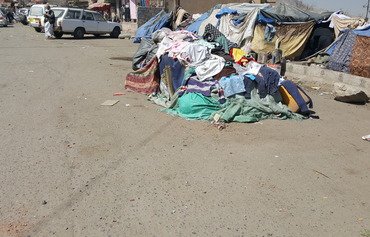Close to two million Yemenis who have been displaced by the war are facing dire conditions made worse by a shortfall in aid, Yemeni officials told Al-Mashareq, calling on international donors to step up their support.
Internally displaced persons (IDPs) are in increasing need of food and humanitarian aid as the war goes on, they said, but a shortfall in funding has left international aid organisations unable to deliver sufficient assistance.
According to a July Task Force on Population Movement (TFPM) report, 1.98 million Yemenis have been displaced by the conflict, or 7% of the population.
The report also identified 946,044 returnees across 20 provinces, which means 10.4% of Yemen's population has experienced the shock of displacement due to conflict in the last 26 months.
![Displaced Yemenis who fled fighting in the Harad area sit under a makeshift shelter at a camp for internally displaced persons in Abs district of Hajjah province on July 23rd. [STRINGER/AFP]](/cnmi_am/images/2017/10/26/10152-Yemen-displaced-family-600_384.jpg)
Displaced Yemenis who fled fighting in the Harad area sit under a makeshift shelter at a camp for internally displaced persons in Abs district of Hajjah province on July 23rd. [STRINGER/AFP]
![A Yemeni girl drinks water collected from a well in an impoverished village on the outskirts of al-Hodeidah on July 23rd. The region has been facing acute water shortages due to drought conditions. [Abdo Hyder/AFP]](/cnmi_am/images/2017/10/26/10153-Yemen-girl-drinks-600_384.jpg)
A Yemeni girl drinks water collected from a well in an impoverished village on the outskirts of al-Hodeidah on July 23rd. The region has been facing acute water shortages due to drought conditions. [Abdo Hyder/AFP]
![Internally displaced persons who fled the fighting in the Harad area of Abs district in Yemen's Hajjah province have taken shelter in this makeshift camp, pictured here on July 23rd. [STRINGER/AFP]](/cnmi_am/images/2017/10/26/10154-Yemen-displacement-camp-600_384.jpg)
Internally displaced persons who fled the fighting in the Harad area of Abs district in Yemen's Hajjah province have taken shelter in this makeshift camp, pictured here on July 23rd. [STRINGER/AFP]
The five areas that have seen the largest increase in IDPs are Aden, Marib, Amran and Ibb provinces and the Sanaa administrative district.
As for the length of displacement, 84% have been forced to live away from their homes for more than a year, the report said.
The displaced population faces loss of livelihood and access to basic social services, which makes them more susceptible to epidemics, food insecurity and malnutrition, it added.
Even when they return, many find their assets and properties have been damaged or destroyed, the report said, making it difficult for them to resume their previous lives.
Insufficient assistance
"The food and other assistance provided by international humanitarian organisations barely covers 30 to 40% of the IDPs' needs," said Abdelwahab al-Washli, head of the Executive Unit for IDPs in Yemen.
The war "has increased the burden multifold on the population in general, and IDPs in particular, because they left their areas and homes to save themselves and their children", he told Al-Mashareq.
"Consequently, they lack the most basic resources to live at the minimum level of subsistence," he said.
The TFPM report identified the IDP population's most pressing needs as food (75%), access to income (8%), shelter/housing (5%) and drinking water (3%).
Due to the shortfall in aid, the Executive Unit distributes humanitarian and food aid to IDPs on a rotating basis, al-Washli said, with a different group receiving aid each month.
The unit works with civil society organisations and the private sector, he said.
About 60% of the IDPs have found shelter with their extended families, while camps are sought mostly by those who have no other alternative, he said.
The unit pays the rent of 1,500 displaced families in Sanaa, who are among the poorest and most destitute segments of the IDP population, al-Washli added.
"Some of the IDPs have taken up modest jobs to help their families put food on the table and cope with their growing needs," he said.
Shortfall in funding
International aid organisations cannot provide all the assistance IDPs need due to a shortfall in funding for relief activities, said Zaid al-Alaya, spokesman for the UN Office for the Co-ordination of Humanitarian Affairs (OCHA) in Yemen.
Only 55% of the funding needed for the 2017 Humanitarian Response Plan has been received, he told Al-Mashareq, adding that this has had a negative impact on the relief efforts of UN-affiliated humanitarian organisations.
Local entities have been working in co-ordination with the UN High Commissioner for Refugees, the International Organisation for Migration, the World Food Programme and the Executive Unit to serve the IDPs, al-Alaya said.
"Their efforts are focused on the most vulnerable groups, such as women, children and people with special needs, among both the IDPs and the segments of the population most affected by the war," he added.
Sanaa is currently accommodating 52,700 displaced families from 13 provinces, primarily Saada and Taez, according to Abdul Wahab Sharafuddin, director of the IDP Unit in Sanaa.
This accounts for about 25% of all IDPs across Yemen, he told Al-Mashareq.
IDPs move to Sanaa "out of their belief that they have a better chance of obtaining aid compared to other provinces", he said, adding that food and other aid provided to them covers only 65% of their needs.
But the district faces various challenges in addressing the displacement crisis, he said, including the inability to accommodate the growing number of students.
There are now 98,000 displaced students in Sanaa, he said, adding that the unit has been working to enroll them in school.
Meanwhile, many schools in Houthi-held Sanaa remain shuttered due to a union strike over the suspension of teachers' salaries.

![A Yemeni man transports food aid through the streets of Sanaa. [Faisal Darem/Al-Mashareq]](/cnmi_am/images/2017/10/26/10155-Sanaa-food-aid-600_384.jpg)







Ahhhhhh God suffices me and He is the best disposer of affairs! I’ve been displaced from Ta'iz. Most of displaced people from Ta'iz are now in Sana'a. I have met a lot of people. Until when …
Reply1 Comment(s)